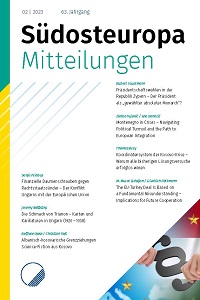Montenegro in Crises: Navigating Political Turmoil and the Path to European Integration
Montenegro in Crises: Navigating Political Turmoil and the Path to European Integration
Author(s): Zlatko Vujović, Ana NenezićSubject(s): Governance, Government/Political systems, Electoral systems, Politics and religion, EU-Approach / EU-Accession / EU-Development
Published by: Südosteuropa Gesellschaft e.V.
Keywords: Montenegro; European Integration; Political Development;
Summary/Abstract: This article examines the complexities of Montenegro’s ongoing political crisis, revealing the complex relationship of political actors and the Serbian Orthodox Church, and their influence on the formation and collapse of successive governments since the fall of the Democratic Party of Socialists (DPS). In the recent presidential elections, President Đukanović, leader of the long-dominant DPS, faced a decisive defeat against Jakov Milatović of the new political party Europe Now which indicated a major shift in public sentiment. Đukanović stepping down from his position as the leader of DPS further signaled a potential transformation in Montenegro’s political dynamics. Consequently, the results of the upcoming parliamentary elections, scheduled for 11 June 2023, will have significant implications for Montenegro’s European integration process, regional stability, and its role in the NATO alliance. The analysis sheds light on the dynamics of Montenegro’s political landscape by discussing the challenges posed by the rapid rise of populist parties and the potential consequences of their economic policies on the country’s financial stability. It explores the upcoming parliamentary elections as critical junctures that may determine Montenegro’s future trajectory – either returning to the Western political orbit and solidifying its EU membership or becoming an unstable link in the NATO alliance.
Journal: Südosteuropa Mitteilungen
- Issue Year: 63/2023
- Issue No: 02
- Page Range: 25-44
- Page Count: 20
- Language: English
- Content File-PDF

